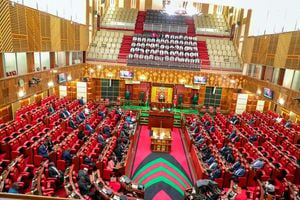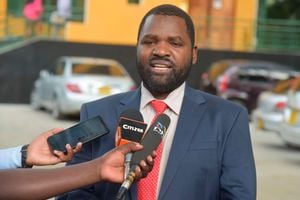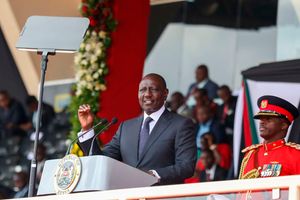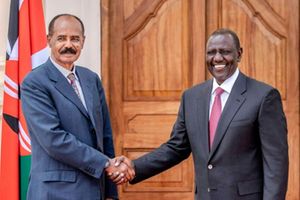
The National Assembly during a sitting.
The performance of the newly-created committees, which saw the total shoot from 28 to 44, will be under scrutiny in a retreat convened by National Assembly Speaker Moses Wetang’ula to assess progress made by the 13th Parliament, now in its midlife.
The five-day retreat to be held in Naivasha from Monday next week will focus on evaluating the legislative progress achieved so far and laying a strong foundation for the remainder of the parliamentary term with emphasis on inclusivity and efficiency in service delivery to Kenyans.
In his communication to the House, Speaker Wetang’ula said the retreat will provide an opportunity for MPs to reflect on the progress made during the first three sessions and strategise for the legislative agenda in the fourth session, set to begin in February.
“The retreat will enable members to take stock of achievements so far and deliberate on key legislative matters expected moving forward. Coming at the midterm of this Parliament, it offers an opportunity to prepare for the remainder of the term,” Mr Wetang’ula said.
Mr Wetang’ula said the retreat will set the tone for Parliament’s activities in 2025, ensuring MPs are well-equipped to tackle legislative priorities and drive meaningful change in governance and service delivery.
It is on the service delivery note that Nation.Africa has learnt that intense scrutiny of performance of the newly created committees will come under microscopic evaluation with proposals already in place that some of them will be merged.
Although the merging of the committees will have to wait until the end of the life of term of 13th parliament when MPs review their Standing Orders to guide the next House, murmurs on the effectiveness and the overlapping roles of the some committees are getting louder in the corridors of Parliament each day.
A highly placed source in Parliament aware of the ongoing discussions told the Nation that some committees that were created at the start of the 13th Parliament have not lived up to the expectations of the House as envisioned during their creation.
A review of the Standing Orders in 2022 increased the number of committees from 28 to 44 with the main aim of increasing efficiency in the oversight role of MPs.
The giant PIC for instance which had over 250 State Corporations to deal with each financial year was split into three-Public Investments Committee on Commercial Affairs and Energy, Public Investments Committee on Governance and Education and the Public Investments Committee on Social Services, Administration and Agriculture.
The source said the three committees have so far done well with the Commercial Affairs and Energy committee under the leadership of Pokot South MP among the best performing ones.
When PIC was operating as one unit, it only managed to examine the records of 30 State Corporations out of the 250 but the splitting of the number has increased with three committees now having examined at least 150 by the end of last year.
There is growing concern among top leadership of the House that the additional committees, especially departmental ones, have not increased efficiency in discharging their mandates.
According to the source, among the committees likely to be merged is the Diaspora Affairs and Migrant Workers Committee chaired by Taita Taveta MP Lydia Haika which is likely to be swallowed by the Labour Committee.
The Regional Development Committee chaired by Sigor MP Peter Lochakapong and Regional Integration Committee chaired by Kipipiri MP Wanjiku Muhia are also likely to face the chopping board with their functions taken by the Defence, Intelligence and Foreign Relations Committee.
According to the Parliament website, there is no single report uploaded for the Migrant Affairs and Diaspora Committee for the two and half years it has been in existence while the Regional Development Committee has only two reports to its name.
“The committees will be merged purely based on their effectiveness and overlapping roles, not because the members in them are lazy,” the source said.
The Public Debt and Privatization Committee is likely to survive as it is seen by members as effective although others are of the opinion that some of its functions can be carried out by Budget and Appropriations Committee while others undertaken by the Transport committee.
National Cohesion and Equal Opportunity Committee is also likely to survive the planned overhaul.
The fate of the Public Petitions Committee chaired by Kitui East Nimrod Mbai which has been on the receiving end in the House lately with the Speaker himself raising concerns twice about its effectiveness in discharging its mandate is still hanging in balance.
In August last year, when the Speaker raised concern about the piling petitions which had not been considered, some MPs suggested that the committee should be disbanded so that petitions can be dealt with various committees instead of lumping them to one
Politics will however also play a key role in disbanding some of the committees as rewarding MPs to be chairpersons of parliamentary committees is normally seen as a political tool to appease the region where the lawmaker comes from.










